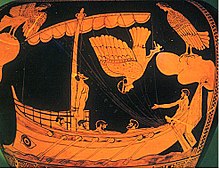Parthenope (mythology)
Parthenope ( Greek Παρθενόπη ) is one of the sirens in Greek mythology .
In Homer's Odyssey , the oldest literary work that mentions the Sirens, they do not yet have individual names. According to Robert Graves-Ranke, later authors such as Plutarch , Johannes Tzetzes and Eustathios of Thessalonike gave these .
This is how the siren Parthenope got its name. She lived with two siblings on an island near the coast of southern Italy. The river god Acheloos was probably considered to be her father .
The Odyssey tells that Odysseus and his ship passed the island of the Sirens during the odyssey in search of his homeland Ithaca . He achieved that he was not harmed by the singing, which was equally beguiling and deadly for all passers-by, by plugging the ears of his sailors with wax and having himself tied to the mast. The Argonauts also sailed safely past the island of the Sirens because Orpheus drowned out their singing with the lyre. The sirens are said to have committed suicide by jumping into the sea, either because they were able to lure Odysseus or because they could not lure Orpheus to them.
After jumping into the sea, Parthenope was washed up dead near Naples and buried in this place. Her cult was celebrated at her tomb with annual donations and bull sacrifices. In addition, the inhabitants of Naples organized an annual event in her honor, organized by the Athenian nauarch Diotimos around 433 BC. A torch relay introduced on an oracle.
Parthenope was worshiped as the city goddess in Naples. Your name therefore u. a. the Roman poet Virgil as a poetic name for Naples. Even Napoleon founded in 1799 based on its name to Southern Italy parthenopean republic .
literature
- Hans von Geisau : Parthenope 1). In: The Little Pauly (KlP). Volume 4, Stuttgart 1972, Sp. 532.
- Hans von Geisau: Seirenes. In: The Little Pauly (KlP). Volume 5, Stuttgart 1975, column 79 f.
- Johannes Ilberg : Parthenope 1 . In: Wilhelm Heinrich Roscher (Hrsg.): Detailed lexicon of Greek and Roman mythology . Volume 3.1, Leipzig 1902, Col. 1653–1655 ( digitized version ).
Web links
Individual evidence
- ↑ Robert Graves-Ranke: Greek Mythology. Sources and Interpretation . Rowohlt, Reinbek near Hamburg, 1984, p. 681 f.
- ↑ E.g. Lykophron, Alexandra 712 ff.
- ^ Pseudo- Aristotle , Mirabilium auscultationes 103; Libraries of Apollodorus 1, 18 and 1, 63; Silius Italicus , Punica 12, 34.
- ↑ Homer , Odyssey 12, 39–54, and 12, 158–200.
- ↑ Apollonios of Rhodes 4, 891–921, and 4, 1264–1290.
- ↑ Hyginus , Fabulae 125, 141 and a.
- ↑ Lykophron, Alexandra 717-721; Dionysios Periegetes 357 ff .; Strabon , Geographika 1, 23; 1.26; 5, 246.
- ↑ Timaeus , FGrH 566 F 98; Lykophron, Alexandra 732 ff .; Strabon, Geographika 5, 246.
- ^ Virgil , Georgica 4, 564.
